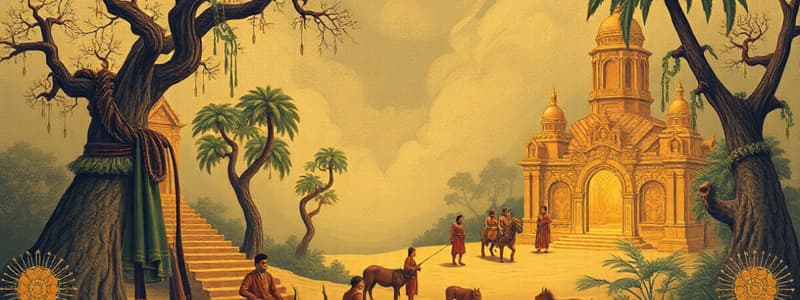Podcast
Questions and Answers
What is the primary lifestyle of human groups during the Paleolithic period?
What is the primary lifestyle of human groups during the Paleolithic period?
- Settled village life
- Hunter-gatherer lifestyle (correct)
- Agricultural communities
- Trade-based economy
Which type of tools became prevalent during the Mesolithic period?
Which type of tools became prevalent during the Mesolithic period?
- Large stone implements
- Wooden tools
- Metallurgical tools
- Microliths (correct)
What significant development marks the beginning of the Neolithic period?
What significant development marks the beginning of the Neolithic period?
- Establishment of trade routes
- Domestication of animals (correct)
- Introduction of metallurgy
- Use of fire for cooking
Which archaeological site is associated with early artistic expression from the Paleolithic era?
Which archaeological site is associated with early artistic expression from the Paleolithic era?
What was a major change in human activity during the transition from the Paleolithic to the Mesolithic period?
What was a major change in human activity during the transition from the Paleolithic to the Mesolithic period?
What crucial agricultural advancement occurred during the Neolithic period?
What crucial agricultural advancement occurred during the Neolithic period?
Which two crops were cultivated in the Neolithic period in India?
Which two crops were cultivated in the Neolithic period in India?
How is the Paleolithic period subdivided?
How is the Paleolithic period subdivided?
Flashcards
Paleolithic Period in India
Paleolithic Period in India
The earliest period of human history in India, characterized by stone tools and a hunter-gatherer lifestyle.
Mesolithic Period in India
Mesolithic Period in India
The era following the Paleolithic period, marked by the emergence of smaller, more specialized stone tools, suggesting adaptability.
Neolithic Period in India
Neolithic Period in India
A period characterized by the development of agriculture, settled communities, and pottery in India.
Hunter-gatherer Lifestyle
Hunter-gatherer Lifestyle
Signup and view all the flashcards
Microliths
Microliths
Signup and view all the flashcards
Bhimbetka Rock Shelters
Bhimbetka Rock Shelters
Signup and view all the flashcards
Chopani-Mandoli Site
Chopani-Mandoli Site
Signup and view all the flashcards
Mehrgarh
Mehrgarh
Signup and view all the flashcards
Study Notes
Prehistoric Era in Ancient India
- The prehistoric period in India spans a vast timeframe, starting from the earliest human presence and extending to the emergence of early civilizations.
- Evidence suggests human activity in India dates back to at least 2 million years ago, based on archaeological findings of tools and other artifacts.
- This era is broadly categorized into Paleolithic, Mesolithic, and Neolithic periods.
Paleolithic Period
- The Paleolithic era witnessed early hominins, or human ancestors, inhabiting the Indian subcontinent.
- Tools and implements, primarily made of stone, were common.
- Evidence points to a hunter-gatherer lifestyle, with groups moving seasonally in pursuit of food resources.
- The Paleolithic period is further subdivided into Lower, Middle, and Upper Paleolithic, each characterized by changes in tool technology, complexity, and possibly behaviour.
- Sites like the Bhimbetka Rock Shelters in Madhya Pradesh present vital evidence of human habitation and early artistic expression.
Mesolithic Period
- The Mesolithic period marks a transitionary phase between the Paleolithic and Neolithic periods.
- This period saw changes in climate and the environment, leading to adaptations in human activity.
- The toolkits became smaller and more specialized, reflecting the diverse resources utilized.
- Microliths, tiny stone tools, became crucial components of the tool assemblages.
- Evidence from sites like the Chopani-Mandoli site in Uttar Pradesh portrays the cultural changes of this era.
Neolithic Period
- The Neolithic period witnessed the development of agriculture and settled communities in India.
- Archaeological finds reveal the emergence of pottery and the cultivation of crops like rice, wheat, and barley.
- Early villages and farming communities appeared, signaling a fundamental shift from the nomadic hunter-gatherer lifestyle.
- The development of pottery suggests increased food storage capacity.
- Excavations at Mehrgarh in Balochistan reveal early evidence for domesticated animals and agricultural practices, showing a progression towards a settled lifestyle.
- Features associated with the Neolithic period include the development of agriculture, the domestication of animals, and the emergence of sedentary settlements.
Key Characteristics of the Prehistoric Era
- Hunter-gatherer lifestyle: Early groups relied on hunting and gathering for survival.
- Stone tools and implements: Stone tools were essential for various tasks, developing in sophistication over time.
- Environmental adaptation: Human populations adapted to environmental changes and resources available.
- Emergence of settled communities: The Neolithic period saw the beginning of settled agricultural communities.
- Cultural expressions: Evidence of early artistic expression (e.g., rock art) is prominent in the Paleolithic.
Studying That Suits You
Use AI to generate personalized quizzes and flashcards to suit your learning preferences.




